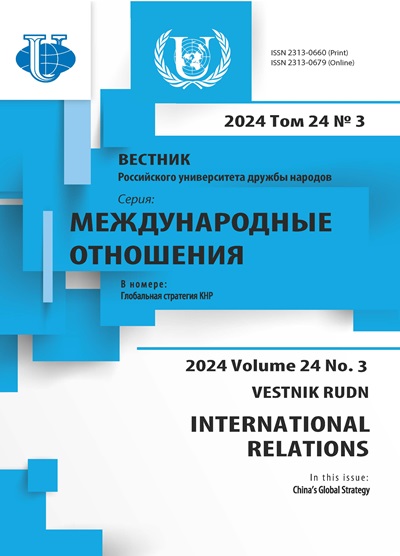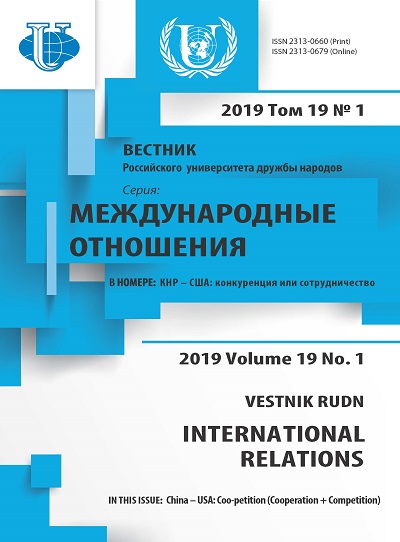Пинг-понговая дипломатия: влияние на установление китайско-американских отношений
- Авторы: Мартыненко С.Е.1, Трусова А.А.1, Черняев М.С.1
-
Учреждения:
- Российский университет дружбы народов
- Выпуск: Том 19, № 1 (2019): КНР — США: конкуренция или сотрудничество
- Страницы: 139-147
- Раздел: ИСТОРИЯ МЕЖДУНАРОДНЫХ ОТНОШЕНИЙ
- URL: https://journals.rudn.ru/international-relations/article/view/20858
- DOI: https://doi.org/10.22363/2313-0660-2019-19-1-139-147
Цитировать
Полный текст
Аннотация
Актуальность темы исследования определяется ролью и местом спортивной дипломатии в международных отношениях и внешней политике. Спорт - явление глобального масштаба. В современном мире он является инструментом политического воздействия с мощнейшим потенциалом и возможностями. История знает немало примеров того, как разные страны использовали этот инструмент для реализации поставленных целей. Подтверждением этому является «дипломатия пинг-понга», которая явилась прорывом в американо-китайских отношениях. Благодаря усилиям премьера Госсовета КНР Чжоу Эньлая и госсекретаря США Генри Киссинджера в отношениях Пекина и Вашингтона удалось установить доверие в 1971 г., а в 1979 г. и дипломатические отношения. Это, в свою очередь, способствовало изменению геополитической ситуации в отношениях США - КНР - СССР: упрочило положение США и Китая и ослабило позиции СССР. Предметом исследования статьи является спортивная дипломатия, ее особый случай - «дипломатия пинг-понга», сыгравшая решающую роль в нормализации отношений между КНР и США и их последующем развитии. В данном исследовании авторы применили принципы историзма и объективности, которые предполагают рассмотрение явлений в динамике их изменения, закономерном историческом развитии. Был использован историко-генетический метод исследования, суть которого состоит в последовательном раскрытии свойств, функций и изменений изучаемой реальности в процессе ее исторического движения. По итогам исследования авторы делают вывод, что пинг-понговая дипломатия оказала значительное влияние на установление дипломатических отношений между двумя державами - КНР и США, а также в дальнейшем способна оказывать положительное воздействие на развитие двусторонних отношений, преодоление проблем и конфликтов между сторонами.
Ключевые слова
Об авторах
Станислав Евгеньевич Мартыненко
Российский университет дружбы народов
Автор, ответственный за переписку.
Email: martynenko-se@rudn.ru
кандидат исторических наук, старший преподаватель кафедры теории и истории международных отношений Российского университета дружбы народов
Александра Андреевна Трусова
Российский университет дружбы народов
Email: 1032152385@rudn.ru
студент кафедры теории и истории международных отношений Российского университета дружбы народов
Михаил Сергеевич Черняев
Российский университет дружбы народов
Email: 1032152269@rudn.ru
студент кафедры теории и истории международных отношений Российского университета дружбы народов
Список литературы
- Боголюбова Н.М., Николаева Ю.В. Геополитика спорта и основы спортивной дипломатии. М.: Издательство Юрайт, 2018.
- Быкова В.В. Спортивная дипломатия как часть «мягкой силы»: имплементация в рамках внешней политики Российской Федерации // Современные научные исследования и инновации. 2015. № 2 (4). URL: http://web.snauka.ru/issues/2015/02/46693 (дата обращения: 06.05.2018).
- Воронцов В.Б. Миссионеры и их наследники. Повороты политики США в отношении Китая. М.: Политиздат, 1986.
- Дегтярев А.В. Роль Совета национальной безопасности в дипломатической подготовке визита Р. Никсона в КНР в феврале 1972 г. // Вестник Томского государственного университета. 2008. № 311. С. 72-79. URL: https://cyberleninka.ru/article/n/rol-soveta-natsionalnoy-bezopasnosti-v-diplomaticheskoy-podgotovke-vizita-p-mniksona-v-knr-v-fevrale-1972-g (дата обращения: 07.05.2018).
- Долгова Д.А. Спорт как инструмент укрепления авторитета КНР на международной арене // Актуальные проблемы современных международных отношений. 2017. № 9. С. 98-106. URL: https://cyberleninka.ru/ article/n/sport-kak-instrument-ukrepleniya-avtoriteta-knr-na-mezhdunarodnoy-arene (дата обращения: 06.05.2018).
- Жохова Д.В., Набиева С.К. Политика и спорт на мировой арене // Новая наука: современное состояние и пути развития. 2015. № 6-3. С. 204-211.
- Киссинджер Г. Дипломатия. М.: Ладомир, 1997.
- Косов А.П. Политика США в отношении КНР в период президентства Р. Никсона // Метаморфозы истории. 2014.№ 5. С. 343-369.
- Лукин А.В. Публичная дипломатия: государственная пропаганда или гражданская инициатива? // Дипломатический ежегодник. М.: Весь мир, 2013. С. 56-86.
- Мартыненко С.Е. К вопросу о роли спорта в развитии и обеспечении международного мира и безопасности // Общество: политика, экономика, право. 2017. № 11. С. 37-41.
- Наумов А.О. Спортивная дипломатия как инструмент «мягкой силы» // Мировая политика. 2017. № 4. С. 32-43. URL: http://e-notabene.ru/wi/article_24852.html (дата обращения: 06.05.2018). doi: 10.25136/24098671.2017.4.24852.
- Окороков А.В. В боях за Поднебесную. Русский след в Китае. М.: Вече, 2013.
- Bao E. “Ping-Pong Diplomacy”: The Historic Opening of Sino-American Relations during the Nixon Administration. 2011. URL: https://docplayer.net/25456253-Ping-pong-diplomacy-the-historic-opening-of-sino-american-relations-duringthe-nixon-administration.html (accessed: 06.05.2018).
- Chu Yuanpeng. Youyi de qiaoliang - xie zai Zhongmei “pingpangqiu waijiao” 25 zhounian zhiji [Friendship Bridge: Notes from the 25th Anniversary of Sino-US Ping-Pong Diplomacy] // Pingpang shijie [Table tennis world]. Beijing, 1997. (На кит. языке)
- Eckstein R. Ping Pong Diplomacy: A View from behind the Scenes // The Journal of American-East Asian Relations. 1993. Vol. 2. № 3. P. 327-342
- Gong Li, Wang Hongxu. Xinshiqi Zhongguo waijiao zhanlue [China's new age diplomatic strategies]. 2014. (На китайском языке)
- Griffin N. Ping-Pong Diplomacy: The Secret History Behind the Game That Changed the World. New York: Skyhorse, 2014
- Itoh M. The Origin of Ping-Pong Diplomacy: The Forgotten Architect of Sino-U.S. Rapprochement. New York: Palgrave Macmillan, 2011
- Kobierecki M.M. Ping-Pong Diplomacy and its Legacy in the American Foreign Policy // Polish Political Science Yearbook. 2016. Vol. 45. P. 304-316
- Qi Pengfei, Li Baozhen. Xin Zhongguo waijiao jianzhi [A brief history of China’s modern diplomacy]. Beijing, 2014. (На китайском языке)
- Shearer D. To Play Ball, Not Make War: Sports, Diplomacy and Soft Power // Harvard International Review. 2014. Vol. 36. № 1. P. 53-57
- Shen Xin. Thirtieth Anniversary of Ping-Pong Diplomacy Marked // Voice of Friendship. Beijing, 2001. P. 2-5
- Wang Guanhua. “Friendship First”: China’s Sports Diplomacy during the Cold War // The Journal of American-East Asian Relations. 2003. Vol. 12. № 3/4. P. 133-153
- Wasserstrom J.N. Beyond Ping-Pong Diplomacy: China and Human Rights // World Policy Journal. 2001. Vol. 17. № 4. P. 61-66
- Xia Yafeng. Negotiating with the Enemy. U.S. - China Talks during the Cold War, 1949-1972. Bloomington: Indiana University Press, 2006
- Xu Gouqi. Olympic Dreams. China and Sports 1895-2008. Cambridge: Harvard University Press, 2008
- Zhang Hua, Xu Junwei, Tang Jianjun. Zhongmei pingpang waijiao de fasheng jizhi ji shijian qishi [Emergence and practical implementation of Sino-US Ping Pong Diplomacy] // Renwen shehui kexue xue bao [Journal of the Humanities and Social Science]. 2015. Vol. 35. № 4. P. 93-96. (На китайском языке)











